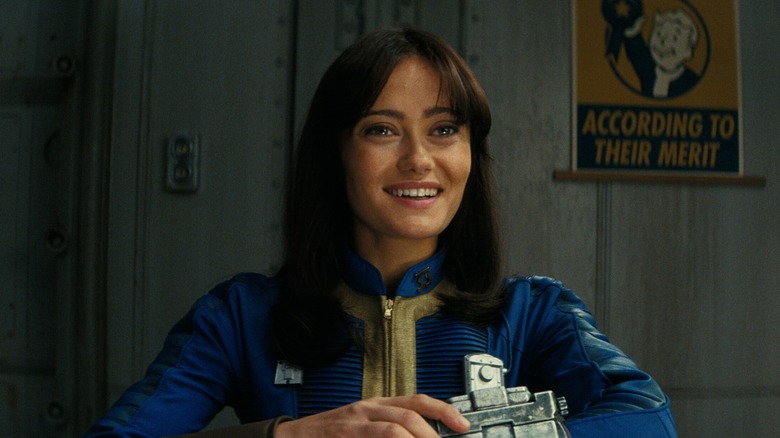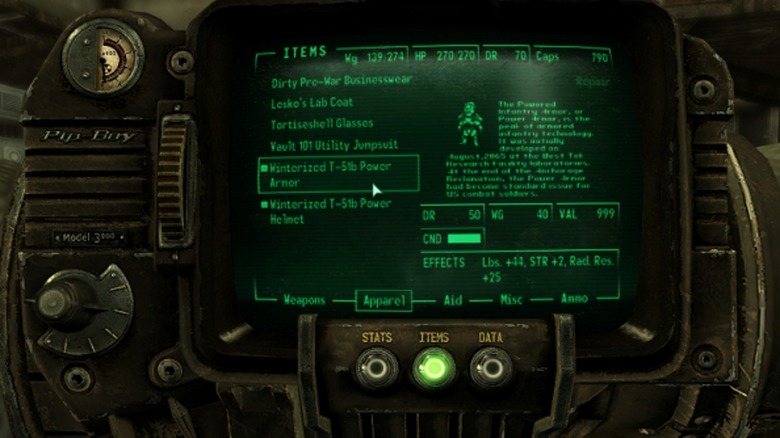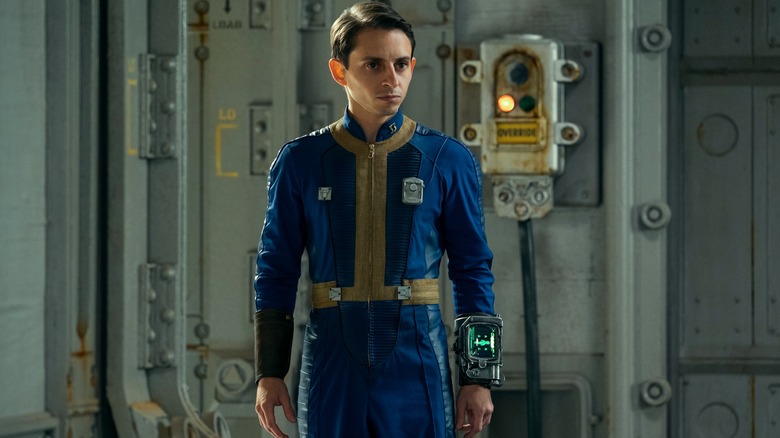The History And Significance Of Pip-Boys In The Fallout TV Series, Explained
This post contains spoilers for Prime Video's "Fallout."
A ravaged post-apocalyptic wasteland, like the one in the "Fallout" video game franchise, is like a minefield waiting to explode. Treacherous terrains, radioactive water bodies, aggressive wastelanders, and mutated insects are just some of the dangers that await any explorer, and "Fallout" relies on one in-game mechanic to immerse players into its dynamic open worlds. A Pip-Boy, short for Personal Information Processor, acts as a diegetic tool in every "Fallout" title, where everything from inventory management to a specialized targeting combat system (known as V.A.T.S) is embedded within this portable wrist computer. Although Pip-Boys were originally issued to vault dwellers, their usage spread to the surface, where several Free State inhabitants relied on them for survival and navigation. Although the mechanics of the Pip-Boy are easy to understand within the confines of the "Fallout" games, how do these devices work in the new Prime Video TV adaptation?
Developed by Lisa Joy and Jonathan Nolan, "Fallout" (read /Film's review) does not explain the concept of Pip-Boys outright. Still, these devices play an integral, unstated role in the series, with the focus understandably shifting to more effective narrative vehicles. After all, the television medium greatly differs from that of video games, and the original purpose of a Pip-Boy — an entry point into a complex world that evolves into an essential weapon in your arsenal — becomes somewhat obsolete in an eight-episode drama that exclusively focuses on three survivors. Nevertheless, Pip-Boys continue to play a seminal role, used diligently by vault dwellers and wasterlanders alike, employed to track something valuable or infiltrate heavily guarded vaults from the outside. To garner a better understanding of these devices, let us dive into the history surrounding Pip-Boys in the games, and how the series utilizes it to strengthen and deepen its worldbuilding.
What do Pip-Boys do in Fallout?
Described as both a convenience and a crutch, Pip-Boys were made by RobCo Industries, with the earliest versions being integrated with superfluous functions such as chat programs or alarms. Over time, different models were distributed to vault dwellers to keep up with the constant demand and relentless upgrades.
The retrofuturist aesthetic of the "Fallout" universe culminates in the way these supercomputers look and feel, as their clunkiness is a deliberate choice, given the role technology plays in the war-torn history of the games. Every "Fallout" title wears a conflicting sentiment on its sleeve, where rose-tinted nostalgia clashes with the dubious hope for a better future, despite the present being too hellish for societal rehabilitation. Similarly, Pip-Boys are relics of a bygone, pre-war era, tuned to keep up with the times, yet they ultimately remain un-sleek and clunky, as if refusing to let go of the past.
This clunky crudeness that most Pip-Boy models exhibit is a product of circumstance, as the Vault Dweller's Survival Guide (a manual sold with physical copies of "Fallout" during its original release) states that these devices were hastily put together within three months to accommodate the overwhelming influx of freshly-registered vault dwellers. Outside of aiding vault dwellers with basic activities and upkeep, refurbished Pip-Boy models are often used by the average wastelander (including player characters) who can use them to identify radioactive areas, scan and scope out enemies, or keep a record of their health and general condition while traversing harsh physical terrain. Some models are also equipped with a radio and compass, as seen when Squire Thaddeus (Johnny Pemberton) plays some old songs while on the road or when Lucy (Ella Purnell) uses her device to arrive at the coordinates that lead to Moldaver's base.
Pip-Boys are an extension of identity in Fallout
In the "Fallout" series, it is revealed that Vault 32 was infiltrated by surface dwellers with Rose MacLean's Pip-Boy, even though her device was presumably buried with her. Norm (Moisés Arias) is shocked after making this discovery, as it heavily implies that Rose is alive, or that she was never buried, as her Pip-Boy made outside entry into a heavily sealed underground bunker possible. By the end, the truth is revealed: Rose is indeed, alive, but has turned into a Ghoul with no sense of self, and her friend, Moldaver (Sarita Choudhury), used her Pip-Boy to hold Hank MacLean (Kyle MacLachlan) hostage in exchange for the cold fusion codes. Although Rose was not able to use her Pip-Boy for the act, her revolutionary spirit lives on through it, as it was used to trigger a chain of events that eventually offers hope for a new beginning where humanity has a chance to rebuild and grow together.
The notion that Pip-Boys are an extension of identity is indisputable in the games, as the devices are embedded into players' every decision, especially when Survival Mode is turned on. This idea is put forth more subtly in the series, reflected in the way certain characters act and navigate the wasteland. For instance, Pip-Boys are often looked down upon by military factions and Ghouls in the games, as they believe that an over-reliance on machinery is an affront to humanity's innate sense of self-preservation. This sentiment is embodied by the characters of Maximus (Aaron Moten) and The Ghoul (Walton Goggins). While Maximus abides by the mandates of The Brotherhood of Steel and relies more on his power armor, The Ghoul completely rejects these devices and uses his shrewd violent tendencies to make it to another day.
Why Pip-Boys are irreplaceable in Fallout
Character attitudes towards technology help us better understand their stance, as they define what kind of people the characters are to an extent. For instance, Maximus is not averse to using a Pip-Boy but simply doesn't due to his organizational affiliation, and this flexibility is apparent when he is given his own Pip-Boy when introduced to the comforts of vault life, where he is willing to accept it. However, Maximus will never heavily rely on a Pip-Boy for survival as much as Lucy (who has been using it in the vaults since she was 10, which is typically when a vault-dweller is gifted one), as his initial motivator is power and ambition, which morphs into a need to belong after he becomes attached to Lucy.
Conversely, The Ghoul's distaste for the device dates back to his life before the Great War, as his wife's Pip-Boy held the key to a terrible truth about Vault-Tec and humanity as a whole — a realization that completely broke his moral compass after he turned into a Ghoul. Pip-Boys are reminders of Vault-Tec's hooks into post-apocalyptic civilization, especially the way the company gambles with innocent lives and posits survival as a capitalist commodity, where such devices are a luxury for those chosen to be vault-dwellers. The democratization of Pip-Boys, where its parts are migrated, scavenged, or repurposed by surface dwellers, is an inevitable aspect of the post-war economy, but The Ghoul would rather rely on his decaying humanity than a device that symbolizes the power that Vault-Tec has over a wasteland that they created in the first place.
Come what may, Pip-Boys will never go out of style, as they legitimize vault-dwellers as a part of a collective, and offer invaluable aid to wastelanders, regardless of their allegiance.
The "Fallout" TV series is now streaming on Prime Video.



